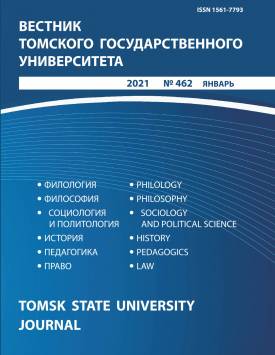“New Materialism” in Sociology: Ontological Consequences
The aim of this article is to provide a critical account for the ontological consequences of “new materialism” in sociology. The author explicates the context of the emergence of “new materialism”. In juxtaposition of materialism in mainstream sociology and social constructivism, “new materialism” significantly extends the sphere of materialistic analysis. It looks at the matter not as a pure container of the form, a pure passivity, but is rewarded with the features of energetism, vitalism and generative capacities. The author discloses the content of “new materialism” through reference to its three requirements: the processuality, eventfulness of the material world; the single nature-culture continuum; the extension of the capacity to act to non-human objects. In sum, all these requirements provide presuppositions for the “flat ontology” of assemblages that is opposed to mainstream sociology. The latter, with its principles of essentialism, reductionism and deontology of objects, postulates the existence of autonomous and self-sufficient sociality. In contrast, in new materialistic ontology none of the substances can be taken as an essence of the social, which entails the affirmation of the heterogeneity and multiplicity of the social. Heterogeneous assemblages appear as a primary ontological unit. Erosion of the social, its ontological devaluation as a separate sphere of reality, leads to the fact that notions of the social and social ontology become problematic. The article reveals ontological dead ends in the identification of assemblages and in the description of their social and materialistic content. The possibility of assemblage identification shows that ontologization of multiplicity can be only a new version of essentialism. The argument of the article is that there are three interpretations of assemblages, distinguished in terms of their material and social content. The first one allows the existence of matter out of social forms, but denies the possibility of its cognition and thus restores the dualism of matter-in-itself and matter-for-ourselves, of nature and society. The second one denies the existence of matter out of social forms, but thus becomes anthropocentric, which contradicts to the initial requirements of “new materialism”. The third interpretation is based on the idea of the independence of matter from social forms, but in such a version “new materialism” does not differ from mainstream sociology. The ontological dead ends of the “new materialism” bare the alternative between the disciplinary and post-disciplinary identities of sociology in the situation of a dynamic and relational social reality.
Keywords
new materialism, mainstream sociology, social constructivism, social ontology, assemblage, correlationism, anthropocentrism, disciplinarity, post-disciplinarityAuthors
| Name | Organization | |
| Kerimov Tapdyg Kh. | Ural Federal University named after the first President of Russia B.N. Yeltsin | kerimovt@mail.ru |
References

“New Materialism” in Sociology: Ontological Consequences | Vestnik Tomskogo gosudarstvennogo universiteta – Tomsk State University Journal. 2021. № 462. DOI: 10.17223/15617793/462/7
